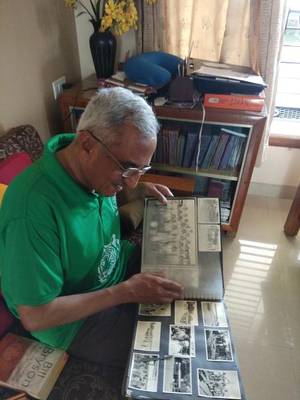Homework in the forest

We’ve all gone through school with teachers nagging us to stay quiet, but when M.N. Shadakshari, principal of Model English High School in Karnataka’s Chikmagalur, asks his students to be silent, the reasons are different. He wants them to listen to the sounds of nature — “the dry leaves of autumn trees rustling in the breeze, the melody of birds’ evening tweets, chirping grasshoppers and crickets, frogs and toads croaking into the night.”
Shadakshari makes for an unusual school principal. He isn’t a strict authority figure, but more a warm, passionate teacher whose guidance is always available for students. And as much as worrying about math and history, Shadakshari is dead keen his wards learn about nature. “Growing up, children are so much more receptive, curious and inquisitive as they learn to ask questions and perceive the world around them. It is crucial that teachers recognise this and ensure that an intuitive connection to the environment is nurtured,” says the 70-year-old.
Long before it became fashionable to do so, Shadakshari was teaching his students about the natural world and climate change. He would take his students on nature walks that would be interspersed with conversations about how forests, rivers, lakes and grasslands feed into the larger ecosystem, and about the birds and animals they encountered on the paths. Inspired by ‘Shadakshari sir’, many students have taken up full-time careers in conservation.
Extra mile outdoors
Chikmagalur borders the Bhadra Wildlife Sanctuary, and it is famous for the vast Shola forests that carpet its hills, and its prominent peaks like the Mullayanagiri, Kemmangundi, Baba Budan Giri and Kudremukh. And it was to these slopes, forests and lakes that Shadakshari took his students.
D.V. Girish, a wildlife conservationist based in Chikmagalur, says it was in the 80s, in Class VI, that Shadakshari first taught him. “He would often come to school early and stay late, so he could spend time answering our questions. He invited botanists, zoologists and ecologists to come and interact with us. He encouraged us to document nature, stay curious, ask questions, and always went that extra mile.”
Shadakshari’s way of making treks interesting was to incentivise the students. “I would send them on patrol and instruct them to observe the forest, write down their observations, and report back to me. Marks were allotted for every bird feather, shell, or bark they identified. It gave me the opportunity to teach more — why a certain plant they collected was poisonous, or why a xerophyte grew in regions of low rainfall, or why the leaf structure of a particular tree was unique.”
While most of his lessons were imparted outdoors, Shadakshari’s classroom lectures were far from drab, his students say. Anything interesting they picked up from their surroundings — an insect, a leaf, a lizard — was taken to ‘Shadakshari sir’ for identification, stored in formaldehyde, and discussed in detail. “While teaching biology and chemistry, there were always so many opportunities to weave in the importance of nature and our dependence on it,” Shadakshari says.
Former student Sharath Indavara, who has recently completed a degree in Science, is an ardent birder and a guide around the lakes and forests of Chikmagalur. “It was Shadakshari sir’s camps and quizzes that encouraged my passion,” he says. “I began observing and documenting birds and wildlife from that time.”
Shadakshari’s advocacy has not been limited to the classroom: as a member of several local conservation groups like WildCAT-C and Nature Conservation Guild, he has been involved in nature conservation.
As our conversation slowly winds down, he tells me about one nature trek where he saw the students’ unbridled joy as they splashed about in a river after a long walk. “I remember thinking how lucky I was to see the true nature of my students — free and unrestrained, not bottled-up like they sometimes are in classrooms.”
There might be valuable lessons for educators from humble Chikmagalur.
The writer is with Wildlife Conservation Society India.
source: http://www.thehindu.com / The Hindu / Home> Profile> Society / by Vaishali Rawat / June 02nd, 2018
